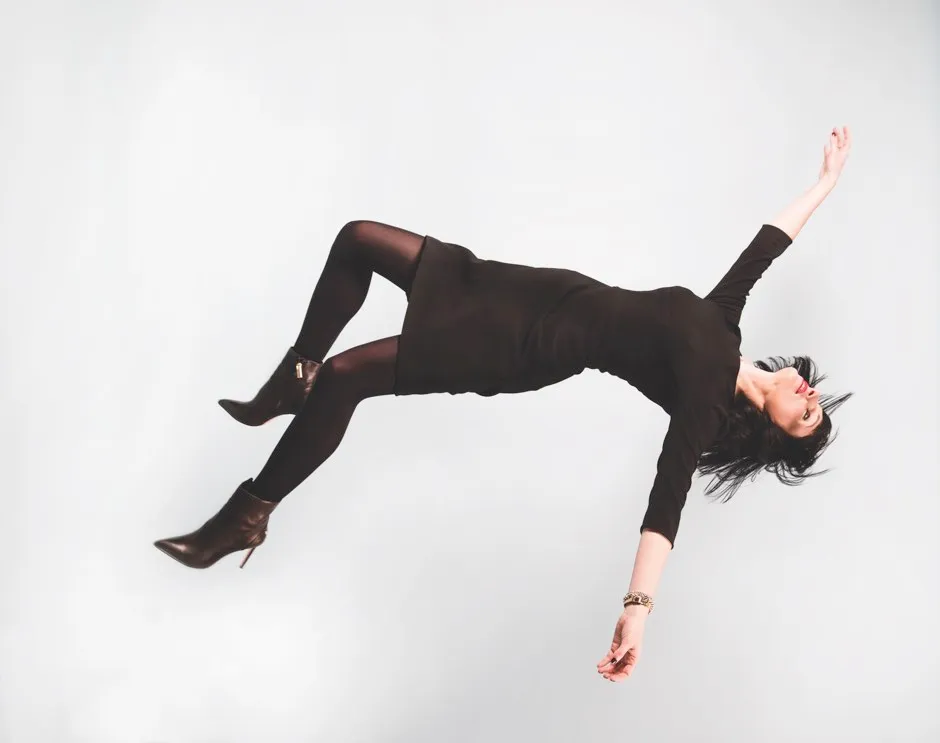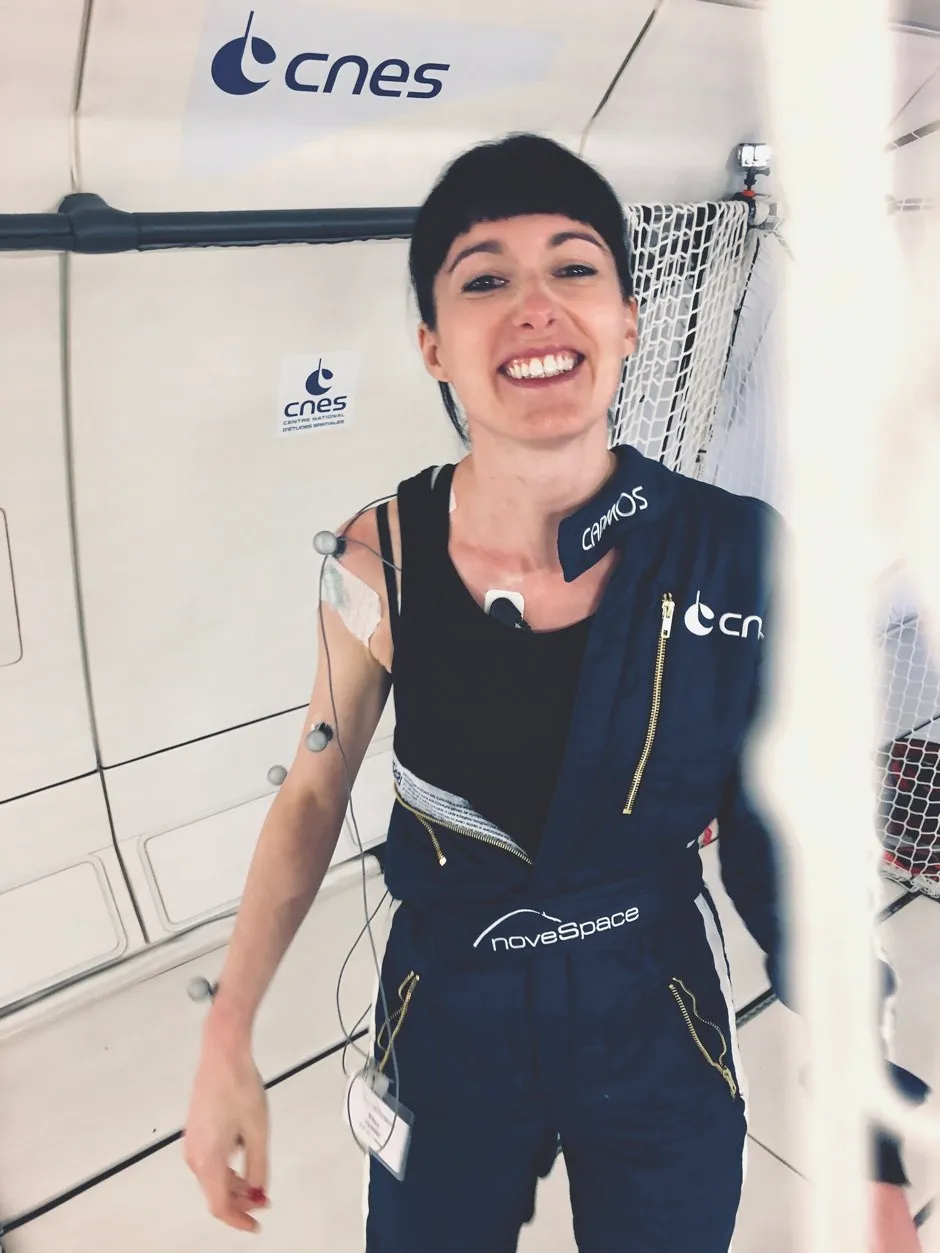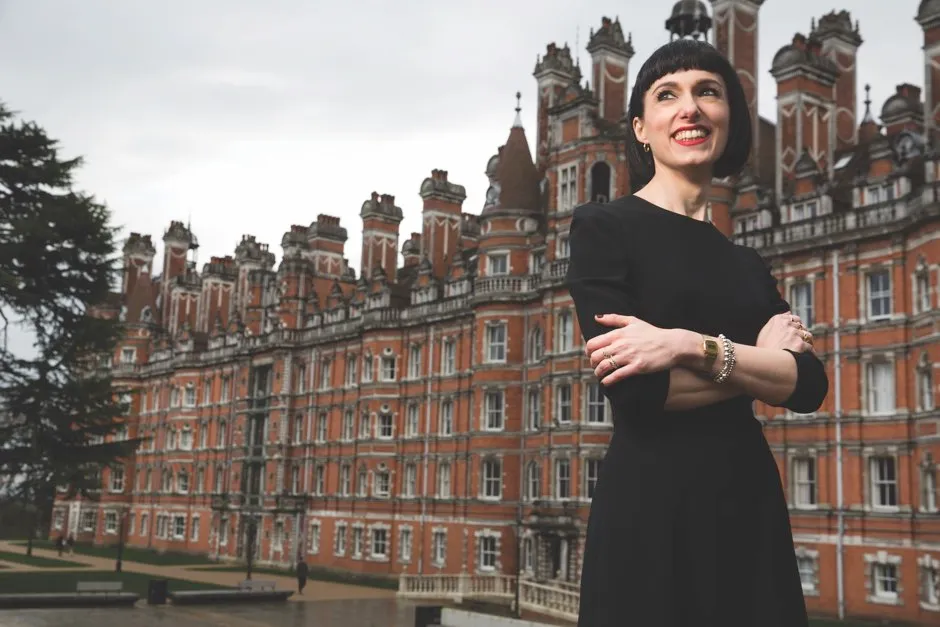With commercial spaceflight on the horizon, scientists are racing to understand what being off-Earth will mean for the human body. Psychologist Dr Elisa Raffaella Ferrè wants to know how gravity, or a lack thereof, will change the way we think.
Elisa is a senior psychology lecturer and the director of the Vestibular Multisensory Embodiment (VeME) lab at Royal Holloway, University of London. Her work has taken her from the lab into the skies with parabolic flights, and in more unusual directions through collaborations with artists, musicians and the Guerilla Science YouTube channel’s Space Yoga series.
Your work looks at the influence of gravity on the brain. Why do we need to study this?
This is a very good and timely question. Last year was the 50th anniversary of the Apollo Moon landing. Fifty years ago we had brave people going into outer space without even knowing what they were doing, and they coped with that. They did an amazing job. But we are at the beginning of a new space age.
Read more about the effect of space on the body:
NASA will send astronauts to Mars in 20 years, and commercial space flight is going to be a reality. Soon, you’ll be able to buy a ticket to go to outer space, enjoy your travel, and come back. The experience of being in outer space is fascinating, but it’s not easy for our bodies and our brains to deal with non-terrestrial gravity. Understanding how gravity can impact our brain is necessary before we go in that direction.
When we’re on Earth, is gravity having an impact on our brain in ways that we don’t realise?
Yeah. The impact of gravity on human cognition is still neglected in psychology and neuroscience. We have been focused on a lot of other aspects of our cognition, like how we recognise colour and how good we are at perceiving sounds.
Gravity is a sensory signal. Earth’s gravity is a constant acceleration of 9.807m/s², namely 1g. But we cannot ‘feel’ it. You can see a colour, you can hear a song, you can spot a mosquito on your skin, but you don’t perceive gravity. Yet gravity is the most persistent sensory signal in the brain and it silently contributes to lots of different things in our daily lives, like walking, jumping, lifting objects, whatever.
We have evolved in a terrestrial environment under a stable 1g acceleration. The vestibular otoliths, which are tiny, sophisticated receptors inside the inner ear, constantly monitor the magnitude and direction of gravitational acceleration.
The importance of gravity for behaviour is evident when we are in a place in which there is not the usual gravitational acceleration, such as outer space. In weightlessness, the human brain has to adapt and cope with the fact that familiar 1g is no longer there. That’s why it’s not so easy to be in outer space.
Astronauts often report the so-called ‘space motion sickness’. Imagine the worst car sickness you’ve had, and now multiply it by 10 or even more. Here we are! This is caused by the absence of gravity: the brain takes time to adjust to a novel gravitational environment.
This is a young field of study, isn’t it?
It is, and it’s a very unusual field of research. Compared to other sensory modalities, our knowledge of gravity as a perceptual signal has not advanced so much. The reason is very simple. It’s not easy to study the contribution of gravity on Earth, where gravity is always there.
Exactly. How do you do it?
We need to be creative in finding ways to study gravity on, and possibly outside, Earth. Fantastic medical research is constantly done on the International Space Station [ISS]. Astronauts are engaged in several experiments – do you remember how busy Tim Peake was? – providing direct data on the effects of gravity on bodily physiology.

However, we are talking about a few people who are extremely well trained to be in outer space. What I’m more interested in is what happens to non-astronauts when exposed to non-terrestrial gravity.
My research combines techniques from cognitive neuroscience and experimental psychology with space research methods. We run experiments supported by the European Space Agency [ESA] on parabolic flight – the famous ‘Vomit Comet’ – and human centrifuges.
Weightlessness is the best thing ever. It’s awe and freedom. Movements are with no effort, no physical constraints, floating. It’s an amazing experience
We are also developing techniques to alter gravity in our lab, allowing us to understand how gravity impacts behaviour in large groups of people here on Earth.
We use inversion tables, which can passively turn people upside down. We also recently demonstrated that virtual reality can be reliably used to trick the brain and make people believe that they are on planet with different gravity, on Mars for example.
Read more about preparing for space travel:
- Small steps: How NASA prepared for the first moonwalk
- How to grow food in space: the Antarctic base preparing for human space colonies
And finally, we apply artificial vestibular simulation, in which some electrodes placed behind the ear electrically stimulate the vestibular nerve [which is responsible for hearing and balance]. It looks a little bit Frankenstein, but it’s totally safe, don’t worry. Using these methods, we can study how perception and cognition change when gravitational information is altered.
You’ve mentioned parabolic flight – can you briefly explain what that is?
This is the real fun part of my research! Parabolic flights are done on a refitted A310 Airbus plane. There are not the usual seats, but there is experimental equipment. Multiple teams are onboard the plane at the same time, and experiments can vary from the biological sciences to physics.
During these flights, the plane follows the trajectory of a parabola. It alternates between rises and descents, at a 45° angle of inclination. Each parabola starts with a ‘pull-up’ acceleration phase in which the gravitational load is double Earth’s gravity, what we call hypergravity or 2g.
The pilots then let the aircraft drop into ‘free-fall’. This phase generates weightlessness (0g). Then pilots perform a ‘pull-out’ acceleration, in which gravity is again double. Each phase lasts for approximately 20 seconds.
During the flight we’ll have many parabolas, around 15 or 16, so the flight itself lasts for two or three hours. It’s a long period of time, but the experiment can only last 20 seconds because of the short exposure to microgravity.
Can you achieve anything in just 20 seconds?!
It’s complicated, but it’s doable. The experiment needs to be well designed, precise, and controlled. We have to make sure that the experiment is perfect before take-off. Then it’s kind of a dance, a choreography of people doing stuff for the experiment in those 20 seconds, in approximately 1.5m2 of space, and while floating.

So, it’s challenging. It’s far from the comfort of the lab, but the experience of weightlessness itself is already a nice reward!
What does it feel like?
Weightlessness is the best thing ever. It’s awe and freedom. Movements are with no effort, no physical constraints, floating. It’s an amazing experience. But, let me be honest: it is not easy.
I mentioned before space motion sickness and we get it during parabolic flights. We normally have some medication, but there is sickness and disorientation.
What effect have you found that gravity has on cognition?
My research group and I are interested in how gravity influences human perception and decision making. For instance, we wanted to see whether decision making is optimal when gravity is no longer our usual 1g acceleration.
We did that in the lab, actually, by asking people to say a random number. You are going to say, ‘How is this related?’ Well, [when you say a series of random numbers] you either you go with the same option, generating ‘stereotype behaviour’. For instance I’d keep saying ‘two’, ‘two’, ‘two’. Or you shift from one number to another, kind of generating ‘optimal behaviour’. So more options, more novel behaviour.
Read more about the future of space travel:
Now, when we think about adaptations to the environment, we want to have a trade-off between stereotype and novel. We don’t always want to go for the same choice, we don’t always want to go for a different choice.
This sort of random number generation task can give us some indexes of how willing and exploring people are in an environment. We did this with participants being upright, in line with the orientation of gravity, or lying down flat, a posture incongruent to gravity.
Astronauts often report the so-called ‘space motion sickness’. Imagine the worst car sickness you’ve had, and now multiply it by 10 or even more
This simple manipulation allowed us to alter the physiological processing of gravity, leading to very different gravitational information reaching our brain. The vestibular organs immediately detect ‘I’m not aligned with gravity’.
We found that, while lying down, people were producing more stereotyped responses. This tells us that participants were not using an optimal strategy to solve the task and that their decision-making was affected by altered gravity.

Now, this is a lab experiment. But imagine that you are on Mars. You need to decide whether to explore or to stay put. Maybe exploring is risky, but you need to do it, and if you don’t move, you don’t explore, this might be a problem.
Our lab manipulation is basically telling us, look, people might not take the right decision when they are away from the home port of terrestrial gravity, which I think might have some implication.
How would you overcome that?
Hopefully with some good training. Indeed, I’m not expecting to see this sort of impairment in astronauts: as I say, they undergo substantial training before going to outer space. I’m thinking more of a commercial space flight; we’ve bought the ticket, then we want to go on the plane.
We really don’t want two years or four years of training before going on our vacation. This scenario requires good training programmes to ensure that potential space travellers are able to make optimal decisions if needed.
It seems to be moving faster than the science is moving. Is that right?
It looks so. I think we have achieved amazing results in the past years regarding technical improvements in space exploration. But we also need to put some effort into understanding how we can improve human performance. I’m not pessimistic; I’ll just say there’s an issue and we need to solve it.
Read more interviews with scientists:
- The quest for quantum gravity: why being wrong is essential to science
- James Lovelock: Cyborgs, turning 100 and the coming age of the Novacene
- Getting under your skin: the surprising life of our largest organ
So, what’s next?
This is a challenging field, but it’s so open to the ‘what’s next’ question: there are so many aspects that we can potentially investigate. We are currently looking at how altered gravity affects risk-taking and social interactions. But we are also doing some research on low-level sensory processing, and we have just finalised a research study on whether pain perception is influenced by altered gravity.
Pain can be affected by gravity?
This is not yet published, as we have just finished it, but yes, altered gravity seems to make people feel less pain, a sort of analgesic effect.
If you were offered a ticket on a commercial spaceflight right now, would you go?
Absolutely yes! Of course I would go.

If you had the choice to go anywhere in space, where would you go?
The Moon.
You said that so quickly, you already knew your answer. Why the Moon?
I always feel emotional when I see the videos of the Moon landing. I’m too young to have seen it live, unfortunately, but I think it was always impressive for me to see that footage.
We spot the Moon from Earth almost every night. Can you imagine how beautiful it might be seeing our planet, Earth, from there? It will give us an awareness of how beautiful, yet delicate and fragile, our Blue Marble is.
Do you think we’ll ever be able to colonise space? That we’ll ever be able to live outside of Earth?
Possibly. Our brain is fantastic at adaptation. Think about on Earth, where people have managed to live in a lot of challenging environments; in the desert, on the peak of a mountain. Space is the ultimate frontier. It is not going to be easy, much harder than what we see in science fiction movies, but yes. Why not?
- This interview first appeared in the February 2020 issue of BBC Science Focus Magazine
Let us know what you think of the episode with a review or a comment wherever you listen to your podcasts.
- Subscribeto theScience Focus Podcaston these services:Acast,iTunes,Stitcher,RSS,Overcast
- Why you should subscribe toBBC Science Focus
Listen to more episodes of theScience Focus Podcast:
- Dr Erin Macdonald: Is there science in Star Trek?
- Kathryn D. Sullivan: What is it really like to walk in space?
- Dean Burnett: What’s going on in the teenage brain?
- Lisa Feldman Barrett: How emotions are made
- Bill Bryson: What should we know about how our bodies work?
- Richard Wiseman: The mindset behind the Moon landing

